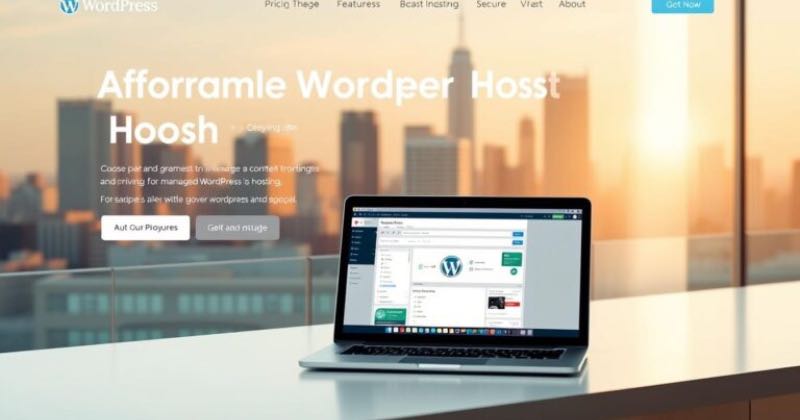Find Cheapest Managed WordPress Hosting USA Providers
The demand for budget-friendly hosting solutions is growing rapidly, especially in the United States. Many websites rely on reliable hosting providers to ensure smooth performance and uptime. Finding the right site support can make all the difference for your online presence.
We’ve analyzed top-rated options to help you make an informed decision. Our research includes load times, uptime percentages, and renewal rates. With over 10 years of testing experience, we provide insights you can trust.
Whether you’re launching a new project or upgrading your current setup, affordable WordPress hosting is within reach. Let’s explore the best options available today.
What is Managed WordPress Hosting?
Managed WordPress hosting simplifies website management by handling technical tasks. This service takes care of updates, security, and performance optimization, allowing you to focus on content and growth. It’s an ideal choice for those who want a hassle-free experience while maintaining a professional online presence.
Definition and Key Features
Managed WordPress hosting is a specialized service designed to optimize your WordPress website. It includes features like automated backups, malware scanning, and CDN integration. These tools ensure your site remains secure and performs at its best.
Additional features include staging environments for testing changes and expert support for troubleshooting. This level of service contrasts with shared hosting, which lacks the specialized configurations needed for WordPress sites.
Benefits of Managed WordPress Hosting
One of the main advantages is the guaranteed uptime of 99.9% or higher. This ensures your site is always accessible to visitors. Server optimization also leads to faster load times, improving user experience and SEO rankings.
Another benefit is reduced technical maintenance. With automatic updates and expert support, you can focus on growing your business instead of managing server issues. This makes it a cost-effective solution for small businesses needing enterprise-grade infrastructure.
Why Choose Managed WordPress Hosting?
Performance and security are critical factors when choosing a hosting provider. A reliable service ensures your site runs smoothly and remains protected from threats. This is especially important for users who want to focus on their content without worrying about technical issues.
Performance and Security
Hosting providers like Bluehost deliver impressive load times of 0.52 seconds and 100% uptime. These metrics are crucial for maintaining a fast and accessible site. LiteSpeed servers, used by Hostinger, and Google Cloud infrastructure, offered by SiteGround, are examples of technologies that enhance performance.
Security is equally important. Providers like DreamHost offer daily malware scans, while 87% of services include free SSL certificates. Web application firewalls add an extra layer of protection, ensuring your site stays safe from cyber threats.
Ease of Use and Support
Ease of use is another key benefit. Custom dashboards, such as Hostinger’s hPanel, simplify site management. These tools are designed to be intuitive, even for beginners.
Support is also a major consideration. SiteGround boasts an average response time of 2 minutes, while Bluehost averages 5 minutes. This ensures users get help quickly when needed.
| Provider | Response Time | Key Feature |
|---|---|---|
| SiteGround | 2 minutes | Google Cloud Infrastructure |
| Bluehost | 5 minutes | 100% Uptime |
| Hostinger | 3 minutes | LiteSpeed Servers |
Case studies show that migrating to a managed solution can improve Time to First Byte (TTFB) by 40%. This highlights the tangible benefits of choosing a provider that prioritizes performance and security.
Top Cheapest Managed WordPress Hosting Providers in the USA
Finding the right provider for your online needs can be a game-changer. Whether you’re launching a new site or scaling an existing one, the right plan ensures smooth performance and reliability. Here’s a breakdown of the top options available today.
Bluehost: Best for New Sites
Bluehost offers an ideal starter plan at $1.99 per month, supporting up to 10 sites. While the renewal cost jumps to $9.99, it’s a great choice for beginners. Its user-friendly interface and reliable uptime make it a top pick for new users.
IONOS: Cheapest for 1 New Site
IONOS stands out with its $1 per month entry price, making it the most affordable option for single-site hosting. However, its limited capacity means it’s best suited for small projects or personal blogs.
Namecheap: Cheapest Long-Term Host
Namecheap provides excellent value for long-term users. At $207.96 for five years, it’s a cost-effective choice with consistent 1.3-second load times. This makes it ideal for those looking for stability over several years.
Hosting.com: Solid for New Sites
Hosting.com offers reliable services for new sites. Its balanced features and competitive pricing make it a solid option for users who want a hassle-free experience without breaking the bank.
DreamHost: Solid Option for Long-Term Hosting
DreamHost is perfect for bloggers and long-term projects. Its robust infrastructure and affordable pricing ensure your site remains secure and performs well over time.
WordPress.com: Cheapest Managed Host
WordPress.com provides a true managed experience at $2.75 per month. While it lacks plugin support, it’s a great choice for users who prioritize simplicity and ease of use.
InMotion: Best for 2-25 Sites
InMotion is tailored for agencies and users managing multiple sites. Its capacity to host up to 25 sites makes it a versatile option for growing businesses.
Hostinger: Most Popular Host
Hostinger balances affordability and features, offering a plan at $2.69 per month. With support for 25 sites and 25GB storage, it’s a favorite among users seeking value and flexibility.
Provider Comparison Table
| Provider | Pricing | Sites Allowed | Storage | Renewal Rates |
|---|---|---|---|---|
| Bluehost | $1.99/mo | 10 | 50GB | $9.99/mo |
| IONOS | $1/mo | 1 | 10GB | $5/mo |
| Namecheap | $207.96/5 yrs | 3 | 20GB | $4.95/mo |
| Hostinger | $2.69/mo | 25 | 25GB | $3.99/mo |
Comparing Pricing and Features
Understanding the true cost of hosting plans is essential for making informed decisions. While entry-level prices may seem attractive, long-term expenses and included features can significantly impact your budget and site performance.
Entry-Level Plans
Entry-level hosting plans often come with low introductory prices. For example, Bluehost starts at $1.99 per month, while IONOS offers a $1 per month plan. However, these prices typically increase after the initial term.
Starter features vary widely. Bluehost and IONOS include free domains, while DreamHost offers unlimited bandwidth. These differences can influence which plan best suits your needs.
Long-Term Costs
When evaluating hosting plans, consider the 5-year cost. For instance, Namecheap’s 5-year plan costs $207.96, while Hosting.com charges $589.80 for the same period. Renewal rates are another critical factor, as 83% of providers increase prices by 200-400% after the initial term.
To avoid renewal traps, consider committing to a 3-year plan with a price-lock guarantee. This ensures stable pricing and better value over time.
Included Features
Included features like traffic allowances and storage can vary significantly. Hostinger allows 25k visits per month, while Namecheap supports up to 50k. Free SSL certificates, daily backups, and malware protection are also common offerings.
By comparing these features, you can choose a plan that aligns with your site’s needs and growth potential.
Performance and Uptime
Website performance and uptime are critical for user satisfaction and search rankings. A fast-loading site that stays online ensures visitors stay engaged and return for more. Let’s explore how load times and uptime guarantees impact your online success.
Load Times and Speed
Load times vary significantly across providers and regions. InMotion delivers an impressive 0.26-second load time in the US, while Hosting.com averages 3.50 seconds in India. These differences highlight the importance of choosing a provider with optimized servers.
Global speed tests show that Bluehost averages 0.52 seconds in the US, while SiteGround achieves 0.33 seconds in Europe. Faster load times improve user experience and can boost conversions by up to 23%, as seen in a real-world eCommerce case study.
Integrating a Content Delivery Network (CDN) like Cloudflare can reduce load times by 58%. This technology distributes your site’s content across multiple servers, ensuring faster access for users worldwide.
Uptime Guarantees
Uptime is equally important. Six providers guarantee 100% uptime, while Hostinger offers 99.55%. Consistent uptime ensures your site remains accessible, which is crucial for maintaining trust and credibility.
Server locations also play a role. 82% of providers use US-based data centers, which can improve speed and reliability for American audiences. Choosing a provider with servers close to your target audience can enhance performance.
Uptime & Load Time Comparison
| Provider | Load Time (US) | Uptime Guarantee |
|---|---|---|
| InMotion | 0.26s | 100% |
| Bluehost | 0.52s | 100% |
| SiteGround | 0.33s | 100% |
| Hostinger | 0.98s | 99.55% |
Security Features
Ensuring your website’s safety is a top priority for any online presence. With cyber threats on the rise, having robust security measures in place is essential. Let’s explore the key features that keep your site protected and running smoothly.
Daily Backups
Regular backups are a lifesaver in case of data loss or hacking attempts. Over 71% of providers include daily backups as part of their services. For example, Bluehost offers 30-day archives, while Rocket.net provides real-time backups for immediate recovery.
These systems ensure your site can be restored quickly, minimizing downtime and potential losses. Always check the backup frequency and retention period when choosing a provider.
SSL Certificates
An SSL certificate encrypts data between your site and its visitors, ensuring secure communication. All listed providers offer free SSL certificates, with some including auto-renewal and wildcard options for added convenience.
This feature is crucial for protecting sensitive information, such as login credentials and payment details. It also boosts your site’s credibility and search engine rankings.
Malware Protection
Malware can compromise your site’s integrity and user trust. Providers like Hostinger offer 24/7 scanning to detect and remove threats automatically. Others provide manual cleanup tools for more control.
Advanced measures, such as Web Application Firewalls (WAF) and DDoS protection, add extra layers of defense. SiteGround’s WAF and Namecheap’s DDoS protection are excellent examples of these features.
For eCommerce sites, compliance with PCI standards is also critical. Providers like InMotion and WP Engine ensure your site meets these requirements, keeping transactions secure.



